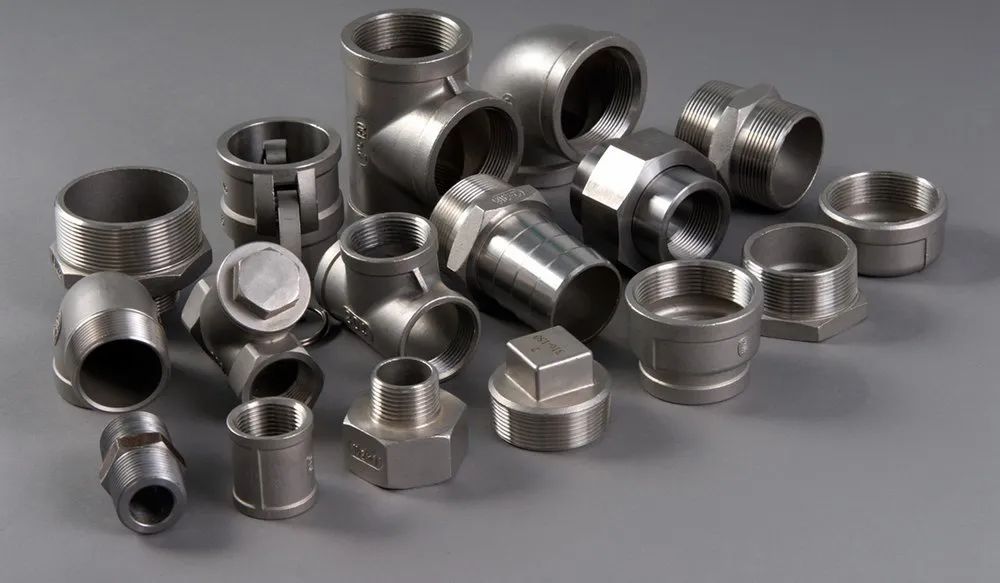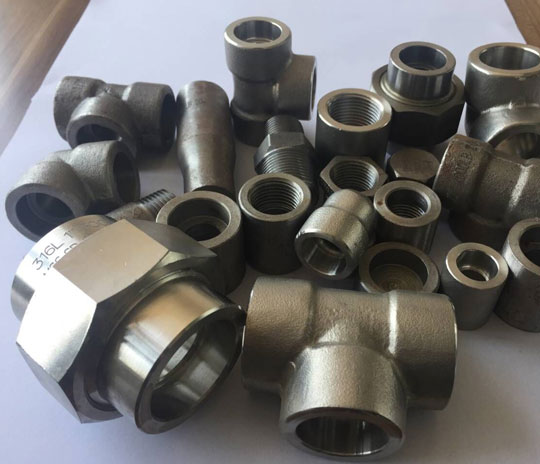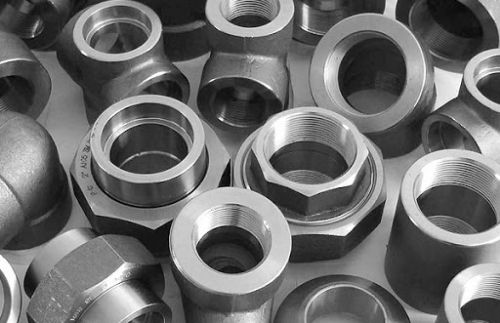ASTM A182 Alloy Steel F22 Fittings: High-Performance Solutions for Various Applications
When it comes to high-pressure and high-temperature environments, ASTM A182 Alloy Steel F22 Fittings are the top choice for industries worldwide. These fittings offer exceptional strength, durability, and resistance to corrosion and thermal stress, making them ideal for demanding applications in industries like oil and gas, petrochemicals, power generation, and chemical processing. In this article, we’ll dive into what ASTM A182 F22 Alloy Steel Fittings are, their properties, advantages, and common uses.
What are ASTM A182 F22 Alloy Steel Fittings?
ASTM A182 F22 is a specification standard for forged or rolled alloy steel pipe fittings, flanges, valves, and parts for high-temperature services. F22 refers to a specific grade of alloy steel containing a mix of chromium and molybdenum, which gives the steel its unique properties, such as resistance to corrosion, high tensile strength, and toughness. Alloy Steel F22 is specially designed to handle elevated temperatures and pressures, making it perfect for industries where the operating environment is particularly harsh.
These fittings, which include elbows, tees, reducers, and other pipe connections, are typically used to join sections of pipe or redirect the flow of fluids in high-stress, high-pressure applications. The alloy’s composition enhances the strength, flexibility, and durability of the fittings, allowing them to perform effectively under extreme conditions.

Properties ASTM A182 F22 Alloy Steel Fittings
ASTM A182 F22 Alloy Steel Fittings possess several critical properties that make them suitable for high-demand applications. Here are some of the key characteristics:
- High Tensile Strength: A182 Alloy steel fittings are known for their excellent tensile strength, making them capable of withstanding high pressure without deforming or failing. This strength is essential in environments where the fittings must endure constant high stress.
- Corrosion Resistance: Alloy steel ASTM A182 fittings contain chromium, which offers superior resistance to corrosion, especially in environments where the fittings are exposed to moisture, chemicals, or corrosive gases. This corrosion resistance helps prolong the life of the fittings, reducing the need for frequent replacements.
- Thermal Stability: F22 Alloy Steel Fittings are highly stable at elevated temperatures, which is crucial for industries like power generation or petrochemical processing, where high temperatures are a constant factor. These fittings maintain their strength and shape even under extreme heat.
- Durability: The addition of molybdenum in A182 alloy steel enhances its durability and resistance to wear and tear. These fittings can handle significant mechanical stresses, making them ideal for applications involving heavy machinery and intense industrial processes.
- Pressure Resistance: These fittings are designed to handle high-pressure systems without cracking, making them perfect for high-pressure pipelines and industrial systems. The enhanced structural integrity ensures they can operate effectively under extreme conditions.
- Weldability and Formability: F22 Alloy Steel Fittings are relatively easy to weld and form, allowing for efficient manufacturing and customization to specific project requirements.
Advantages of ASTM A182 F22 Alloy Steel Fittings
ASTM A182 F22 Alloy Steel Fittings offer several advantages over other materials, making them a preferred choice for various industrial applications. Let’s look at some of the benefits:
- Longevity and Reliability: One of the most significant advantages of A182 alloy steel fittings is their long service life. These fittings are highly durable and resist wear and tear, reducing maintenance costs and ensuring reliable operation over extended periods.
- Cost-Effective: Although the initial cost of ASTM A182 F22 Alloy Steel Fittings may be higher than some other materials, their durability and resistance to damage reduce the need for frequent replacements. Over time, this makes them a cost-effective solution for industries that require long-lasting, high-performance fittings.
- Safety: Alloy steel ASTM A182 fittings offer enhanced safety in industrial environments. Their high tensile strength and resistance to corrosion, pressure, and temperature mean they are less likely to fail under extreme conditions, reducing the risk of accidents and system malfunctions.
- Versatility: ASTM A182 F22 Alloy Steel Fittings are highly versatile, suitable for a wide range of industries and applications. From oil and gas refineries to power plants and chemical factories, these fittings perform exceptionally well in diverse environments.
- Environmental Resistance: These fittings are resistant to many environmental factors, including exposure to corrosive chemicals, gases, and extreme weather conditions. This makes them ideal for outdoor and underwater applications where standard fittings would quickly degrade.


Schedule and Size Chart
| Nominal Pipe Size (NPS) | Outside Diameter (OD) | Schedule 40 (Thickness) | Schedule 80 (Thickness) | Schedule 160 (Thickness) |
| 1/2 inch | 21.3 mm | 2.77 mm | 3.73 mm | 4.78 mm |
| 3/4 inch | 26.7 mm | 2.87 mm | 3.91 mm | 5.56 mm |
| 1 inch | 33.4 mm | 3.38 mm | 4.55 mm | 6.35 mm |
| 1 1/2 inch | 48.3 mm | 3.68 mm | 5.08 mm | 7.14 mm |
| 2 inch | 60.3 mm | 3.91 mm | 5.54 mm | 8.74 mm |
| 3 inch | 88.9 mm | 5.49 mm | 7.62 mm | 11.13 mm |
| 4 inch | 114.3 mm | 6.02 mm | 8.56 mm | 13.49 mm |
| 6 inch | 168.3 mm | 7.11 mm | 10.97 mm | 18.26 mm |
Mechanical Properties Chart
| Property | Value |
| Tensile Strength | 415 MPa (min) |
| Yield Strength | 205 MPa (min) |
| Elongation | 20% (in 2 inches) |
| Hardness (HBW) | 197 HB (max) |
| Impact Strength (Charpy V-notch) | Excellent toughness at elevated and low temperatures |
Specifications Chart
| Specification | Detail |
| Material Grade | ASTM A182 F22 |
| Product Types | Forged fittings, Flanges, Valves, and Parts for high-pressure applications |
| Standards | ASME B16.5, ASME B16.11, ASME B16.47, ASME B16.9 |
| Application Standard | ASME Boiler & Pressure Vessel Code |
| Heat Treatment | Normalized and Tempered |
| Class | 150, 300, 600, 900, 1500, 2500 |
Chemical Composition Chart
| Element | Percentage (%) |
| Carbon (C) | 0.05 – 0.15 |
| Chromium (Cr) | 1.90 – 2.60 |
| Molybdenum (Mo) | 0.87 – 1.13 |
| Silicon (Si) | 0.50 (max) |
| Phosphorus (P) | 0.025 (max) |
| Sulfur (S) | 0.025 (max) |
| Manganese (Mn) | 0.30 – 0.60 |
| Nickel (Ni) | 0.50 (max) |
| Vanadium (V) | 0.05 (max) |
| Iron (Fe) | Balance |
Physical Properties Chart
| Property | Value |
| Density | 7.8 g/cm³ |
| Melting Point | 1390°C – 1440°C |
| Thermal Conductivity | 33.3 W/m·K (at 20°C) |
| Electrical Resistivity | 0.70 µΩ·m |
| Coefficient of Expansion | 11.0 µm/m·°C (20°C to 100°C) |
Application Chart
| Industry | Application |
| Oil and Gas | Pipelines, drilling rigs, and offshore platforms |
| Power Generation | High-pressure steam pipes, turbine components, and heat exchangers |
| Petrochemical & Chemical Processing | Chemical reactors, pressure vessels, and pipeline systems |
| Refineries | High-temperature fluid transfer systems |
| Marine Engineering | Shipbuilding, underwater pipelines, and offshore structures |
| Aerospace | Engine parts, exhaust systems, and structural components |
| Automotive | Exhaust manifolds and turbocharger components |
ASTM A182 F22 Alloy Steel Fittings vs. Other Materials
When comparing F22 Alloy Steel Fittings to other materials, it’s clear that alloy steel offers several distinct advantages, particularly in high-pressure, high-temperature environments. Some of the key differences include:
- Compared to Carbon Steel: While carbon steel fittings are less expensive, they lack the high-temperature and corrosion resistance of alloy steel. Alloy steel fittings, particularly those made from ASTM A182 F22, are better suited for applications where durability and longevity are paramount.
- Compared to Stainless Steel: Stainless steel is often praised for its corrosion resistance, but alloy steel F22 fittings offer higher tensile strength and pressure resistance, making them more suitable for extremely high-pressure systems.
- Compared to Cast Iron: Cast iron fittings are brittle and not suitable for high-pressure or high-temperature applications, while F22 Alloy Steel Fittings offer superior strength, flexibility, and thermal stability.
With their superior strength, corrosion resistance, and longevity, ASTM A182 F22 Alloy Steel Fittings offer unmatched performance compared to other materials. Whether you’re looking for fittings that can handle extreme heat, pressure, or corrosive chemicals, A182 alloy steel fittings provide a cost-effective and reliable solution that ensures safety and efficiency in your industrial processes.
Global Reach
ASC LLP boasts a robust global presence, committed to delivering unparalleled service and quality to clients around the world. Our dedication to prompt delivery and exceptional customer care sets us apart in the industry. Major corporations across the USA, Europe, Asia, and other regions place their trust in our high-quality ASTM A182 Alloy Steel F22 Fittings. This widespread trust underscores our reputation for reliability and excellence. By consistently meeting and exceeding the expectations of our international clientele, we continue to solidify our position as a leader in the global steel market.

Countries We Export To
UNITED STATES, EUROPE, UK, UAE, SAUDI ARABIA, OMAN, KUWAIT, JORDAN, QATAR, INDONESIA, MALAYSIA, BRAZIL, SPAIN, ITALY, FRANCE, GERMANY, BAHRAIN, SRI LANKA, AZERBAIJAN, AUSTRALIA, AUSTRIA, PHILIPPINES, TURKEY, RUSSIA, IRAN, IRAQ, CANADA, KOREA, JAPAN, YEMEN, FINLAND, ZIMBABWE, HUNGARY, PORTUGAL, VIETNAM, MOROCCO, THAILAND, SOUTH AFRICA, MEXICO, SINGAPORE, GREECE, KUWAIT, POLAND, NEW ZEALAND, SWEDEN, SWITZERLAND, BELGIUM, BHUTAN, BANGLADESH, TAIWAN, ROMANIA, CAMBODIA, KAZAKHSTAN, AFGHANISTAN.

